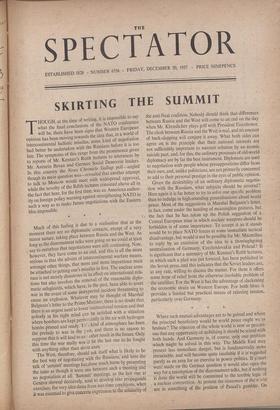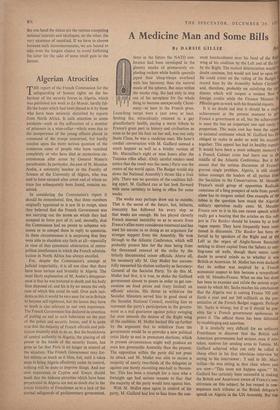SKIRTING THE SUMMIT
THOUGH, at the time of writing, it is impossible to say what the final conclusions of the NATO conference will be, there have been signs that Western European opinion has been moving towards the idea that, in a world of intercontinental ballistic missiles, some kind of negotiation had better be undertaken with the Russians before it is too late. The symptoms of this range from the prominence given to reports of Mr. Kennan's Reith lectures to utterances by Mr. Aneurin Bevan and German Social Democrat leaders. . In this country the News Chronicle Gallup poll—angled though its main question was—revealed that another attempt to talk to Moscow would meet with widespread approval, while the novelty of the Reith lectures consisted above all in the fact that here, for the first time, was an American author- ity on foreign policy warning against strengthening NATO in such a way as to make future negotiations with the Eastern bloc impossible.
Much of this feeling is due to a realisation that at the moment there are no diplomatic contacts, except of a very minor nature, taking place between Russia and the West. As long as the disarmament talks were going on we could at least say to ourselves that negotiations were still continuing. Now, however, they have come to an end, and this is all the more serious in that the advent of intercontinental warfare means, amongst other things, that more and more importance' must be attached to getting one's missiles in first. The nuclear arms race is not merely disastrous in its effect on international rela- tions but also involves the removal of the reasonable diplo- matic safegbards, which have, in the past, been able to avert war in the event of some unexpected incident threatening to cause an explosion. Whatever may be thought of Marshal Bulganin's letter to the Prime. Minister, there is no doubt that there is an urgent need to lower international tension and that nobody in his right mind can be sa tisfied. with -a situation where bombers are kept perrot.ently in the air with hydrogen bombs primed and ready. 'I h, kind of atmosphere has -been the prelnde to war in the past, and there is no reason to suppose that it will lead to an:r other result in'the future. Only this time the war really woi ld be the last one to be fought with anything other than stone axes. The West, therefore, should ask itself what is likely to be the best way of negotiating with the Russians, and here the talk of 'summit' meetings has, done much harm by presenting the issue as though it were one between such a meeting and no negotiation.at all. 'Summit' meetings, as the last one at Geneva showed decisively, tend to develop into propaganda exercises; the very idea dates from war-time conditions, when it was essential to give concrete expression to the solidarity of the anti-Nazi coalition. Nobody should think that differences between Russia and the West will come to an end on the day when Mr. Khrushchev plays golf with President Eisenhower. The clash between Russia and the West is real, and no amount of back-slapping will conjure it away. What both sides can agree or is the principle that their national interests arc not sufficiently important to warrant solution by an atomic suicide pact, and, for this, the ordinary, processes of old-world diplomacy are by far the best instrument. Diplomats are used to negotiation with people whose presuppositions differ from their own, and, unlike politicians, are not primarily concerned to add to their personal prestige in the eyes of public opinion. Given. the desirability of an ordinary diplomatic negotia- tion with the Russians, what subjects should be covered? Here again it is far better to try to solve one specific problem than to indulge in high-sounding generalisations about world peace. Most of the suggestions in Marshal Bulganin's letter, in fact, come under the heading of meaningless gestures, but the fact that he has, taken up the Polish suggestion of a Central European zone in which nuclear weapons should be forbidden is of some importance. To 'accept it as. it stands would be to place NATO forces at some immediate tactical disadvantage, but would it not be possible for Mr. Macmillan to reply by an extension of the idea to a thorOughgoing neutralisation of Germany, Czechoslovakia and Poland? It is significant that a summary of Mr. Kennan's Reith lectures, in, which such a plan was put fOrward, has been published in the Soviet press, and this indicates that the Soviet leaders are, at any rate, willing to discuss the matter. For them it offers some hope of relief from the otherwise insoluble problem of the satellites. For the West itha's the advantage of slackening the economic strain on Western Europe. For both blocs it provides a limited but practical means of relaxing tension, particularly over. Germany.
Where such mutual advantages are to be gained and where the principal beneficiary would be world peace ought we to hesitate?"The situation of the whole world is'now so precari- ous that any opportunity of stabilising it should. be.seized with both hands. And Germany is, of course, 'only, one prOblem 'which might be solved in this way. The Middle. East may present less immediate danger, but is fundamentally more intractable, and will become quite insoluble if it is-regarded purely as an area for an exercise in power politics. If a start were made on the German question it would also open the way for a, resumption of the disarmament talks, but if nothing is done the world will be committed to the terrible logic of a nuclear competition. At present the statesmen of the world are in something of the position of Pascal's gambler. On the one hand the stakes are the various competing national interests and ideologies; on the other, the very existence of mankind. If we have to choose between such incommensurates, we are bound to take even the longest chance to avoid forfeiting the latter for the sake of some small gain to the former.



































 Previous page
Previous page